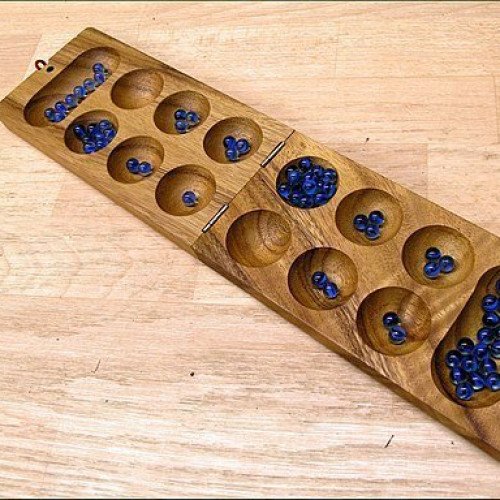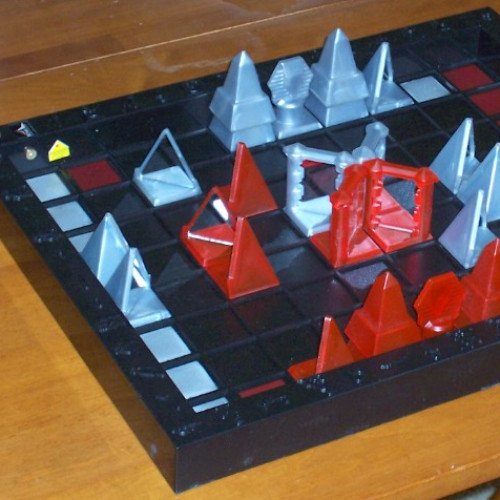KALAH VS KHET

KALAH
Kalah, also called Kalaha or Mancala, is a game in the mancala family invented in the United States by William Julius Champion, Jr. in 1940. This game is sometimes also called "Kalahari", possibly by false etymology from the Kalahari desert in Namibia. As the most popular and commercially available variant of mancala in the West, Kalah is also sometimes referred to as Warri or Awari, although those names more properly refer to the game Oware. For most of its variations, Kalah is a solved game with a first-player win if both players play perfect games. The Pie rule can be used to balance the first-player's advantage. Mark Rawlings has written a computer program to extensively analyze both the "standard" version of Kalah and the "empty capture" version, which is the primary variant. The analysis was made possible by the creation of the largest endgame databases ever made for Kalah. They include the perfect play result of all 38,902,940,896 positions with 34 or fewer seeds. In 2015, for the first time ever, each of the initial moves for the standard version of Kalah(6,4) and Kalah(6,5) have been quantified: Kalah(6,4) is a proven win by 8 for the first player and Kalah(6,5) is a proven win by 10 for the first player. In addition, Kalah(6,6) with the standard rules has been proven to be at least a win by 4. Further analysis of Kalah(6,6) with the standard rules is ongoing. For the "empty capture" version, Geoffrey Irving and Jeroen Donkers (2000) proved that Kalah(6,4) is a win by 10 for the first player with perfect play, and Kalah(6,5) is a win by 12 for the first player with perfect play. Anders Carstensen (2011) proved that Kalah(6,6) was a win for the first player. Mark Rawlings (2015) has extended these "empty capture" results by fully quantifying the initial moves for Kalah(6,4), Kalah(6,5), and Kalah(6,6). With searches totaling 106 days and over 55 trillion nodes, he has proven that Kalah(6,6) is a win by 2 for the first player with perfect play. This was a surprising result, given that the "4-seed" and "5-seed" variations are wins by 10 and 12, respectively. Kalah(6,6) is extremely deep and complex when compared to the 4-seed and 5-seed variations, which can now be solved in a fraction of a second and less than a minute, respectively.
Statistics for this Xoptio

KHET
Khet is a chess-like abstract strategy board game using lasers that was formerly known as Deflexion. Players take turns moving Egyptian-themed pieces around the playing field, firing their low-powered laser diode after each move. Most of the pieces are mirrored on one or more sides, allowing the players to alter the path of the laser through the playing field. When a piece is struck by a laser on a non-mirrored side, it is eliminated from the game. Under its original name, the game was a Mensa Select Award winner. Its name was changed on September 15, 2006. The new game retains the same rules of gameplay, but has a different design, including a new color scheme and a new box design. Under the new name, the game was one of five finalists for the 2007 Toy of the Year award. Professor Michael Larson and two students, Del Segura and Luke Hooper, designed the game as a class project at Tulane University. (Professor Larson is now at the University of Colorado.) The game was introduced to the public in the spring of 2005, and was first brought to prominence at the New York Toy Fair of that year. The game was first shipped in October 2005. The first Deflexion World Championship was held December 10, 2005 under the dome at the Massachusetts Institute of Technology. Registration was free, and the participants competed for cash and other prizes. The winner was an MIT student. Under the new name, Khet, the first Regional Championship took place in April 2006 at the famous Café du Monde in the New Orleans French Quarter. Twenty-four participants competed for a number of prizes. As a special bonus, the Eye of Horus beam splitter was unveiled at the very end, and used by each player in the championship game. Khet was also featured on a recent episode of the HGTV show "I Want That: Tech Toys". Footage from the New Orleans tournament was included in the broadcast. In 2017 a company called "Thinkfun" acquired the license for the now out of print Khet 2.0 and rebranded the game "Laser Chess". Now with a new, modernized scifi look, it brings the exact same rules and feel of Khet 2.0 back to the table.